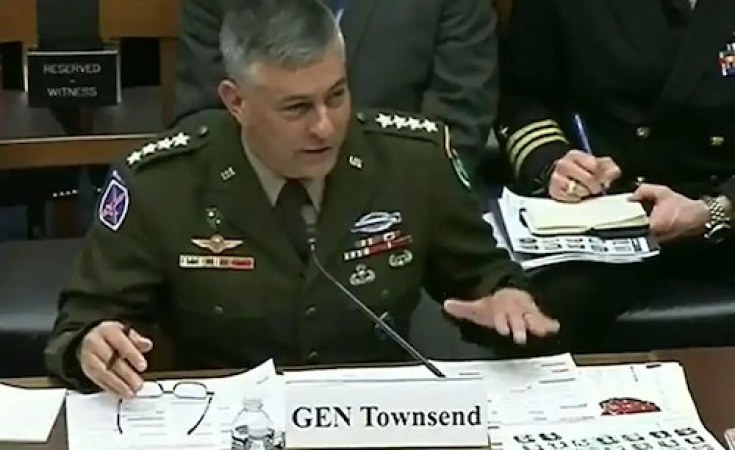Just weeks after the Russian invasion of Ukraine in March, General Stephen J. Townsend - commander of the U.S. Africa Command, known as Africom - testified before the House and Senate Armed Services Committees. The impact of the Russian invasion can be seen by comparing this testimony with the Committee hearings in April 2021.
Although General Townsend referred to Russia in his 2021 testimony, the focus was almost entirely on China. "The first thing I am concerned about with China, number one, is an Atlantic Cost naval base," Townsend told the Senate Armed Services Committee. "The most significant threat, I think, from China," he continued, "would be to gain a militarily useful naval facility on the Atlantic coast of Africa." That "is my number one global power competition concern."
Subsequently, the Wall Street Journal reported on December 6 that U.S. intelligence reports "suggest China intends to establish its first permanent military presence on the Atlantic Ocean - at Bata, a port in Equatorial Guinea on the Atlantic coast of Africa.
In the prepared statement for his 2022 testimony to the House and Senate Armed Services Committees, Townsend stated that "strategic rivals, China and Russia, have long recognized Africa's importance. "Both nations leverage opportunities to erode U.S. influence with African nations. Both nations are gaining ground on the continent," he added. "Both nations successfully convert soft and hard power investments into new partnerships. Both nations exert political influence at U.S. expense." And, he argued, "How African governments choose partners may determine the future of U.S. values-based influence in international political fora."
Townsend told the Senate Armed Services Committee in 2022 that his number one concern "is ensuring that the U.S. maintains strategic access and influence, and I think, for me, the primary concerns there are China, and to a little lesser degree, Russia." And "then the second thing would be countering threat of violent extremists there, primarily al Qaeda's arm, al Shabbab [sic], in East Africa."
"China is the longer-term threat, the pacing threat, but today it is Russia," the General said, citing the activities of the Russian state-sponsored mercenary company, the Wagner Group, which he said was "essentially an arm of the Russian state."
Headed by Yevgeny Prigozhin, an oligarch with close ties to President Vladimir Putin. The Wagner group was founded in 2014 to support the Russian invasion of eastern Ukraine and Crimea. In Africa, Wagner has been active in Sudan, Libya, the Central African Republic, Mozambique, Madagascar, Burkina Faso, and Mali. The company has deployed thousands of mercenaries in these countries in exchange for payments in cash and valuable minerals and control of mining operations and other lucrative assets.
Since the command was established in 2008, the relative ranking of challenges to U.S. security interests has shifted even as the focus has remained on China and Russia, as well as on maintaining access to African military facilities and strategic resources - particularly oil - and countering terrorism. As General Townsend explained in his prepared statement for the March 2022 hearings, "During my three years at Africom, Africa's geostrategic importance has gained increasing global recognition, driving our strategic rivals to successfully leverage both soft and hard investments into political influence, sometimes malign, and hard military advantage."
"Africa sits astride six strategic chokepoints and sea lines of communication, enables a third of the world's shipping, and holds vast mineral resources," the testimony states. In addition, "Africa possesses vast untapped energy deposits, including one-third of the world's mineral reserves and rare earth minerals." Townsend said "the winners and losers of the 21st century global economy may be determined by whether these resources are available in an open and transparent marketplace or are inaccessible due to predatory practices of competitors," and he went on to identify Chinese and Russian economic, military, and diplomatic activities in Africa and terrorism as the principal challenges to U.S. interests.
Despite the outbreak of the war in Ukraine and the Pentagon's official "pivot to Asia", Africa remains of key importance for American security policy planners. The Biden Africa policy continues along the lines established by the Obama administration.
Biden resumed airstrikes in Somalia and other counterterrorist operations throughout the continent. In October, the administration completed the sale of counterinsurgency aircraft to Nigeria, a deal initiated by Obama. And on April 14, the State Department announced approval of the sale of twelve Bell Helicopter AH-1Z helicopter gunships to Nigeria, armed with 20mm machine guns and guided missiles. The sale through the U.S. Foreign Military Sales program is going ahead despite the failure of the Nigerian government to hold anyone accountable for the army's attack on a peaceful demonstration in Lagos against police brutality in October 2020, in which eleven people were killed.
And in the FY 2023 security assistance budget request, Biden proposes maintaining the current level of funding for the Nonproliferation, Anti-Terrorism, and Related Programs; Peacekeeping Operations programs; International Military Education and Training programs; and Foreign Military Financing programs for African countries.
In fact, the Russian invasion of Ukraine and China's growing economic and military activities on the continent have only increased the importance of the continent for American officials, policymakers, and legislators. As a result, Africa's significance in American security policy will continue to rise and it will continue to be a major arena for the struggle for global supremacy between Russia, China, and the United States.
This is a prospect that does not bode well for the stability of African countries or the security of their people.
Daniel Volman is the Executive Director of the African Security Research Project in Washington, DC, and a specialist on U.S. military policy toward Africa and African security issues.


